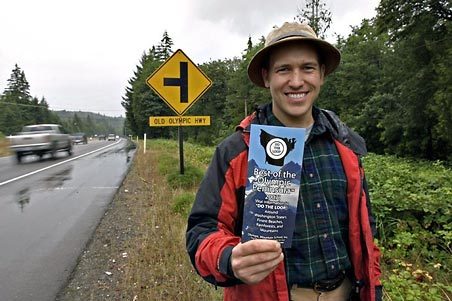Jason Bausher, owner of the Olympic Mountain School and publisher of the “Best of the Olympic Peninsula” travel guide, has done a little research since getting his first cease-and-desist letter from the U.S. Olympic Committee regarding his use of the word “Olympic.”
His conclusion: with almost 500 other businesses named “Olympic,” western Washington will face an economic crisis if the USOC sues each business that doesn’t agree to change its name.
To prove his point, Mr. Bausher compiled a list identifying the affected businesses and a table (thumbnail below) indicating where each is located. Not surprisingly, most are based on the Olympic Peninsula, near Seattle, or near Olympia. Port Angeles leads all cities with 72 “Olympic”-named businesses, followed by Seattle (44), Sequim (36), Bremerton (29), and Olympia (28).

Distribution of “Olympic” businesses in western Washington
(click for PDF)
“The U.S. Olympic Committee threatens to cripple Washington’s economy by suing businesses named in honor of our Olympic Peninsula,” Mr. Bausher says. “The 2010 Winter Games will come and go, but the Olympic name has been Washington’s heritage since 1788.”
The source of the USOC’s authority stems from the Ted Stevens Amateur Sports Act of 1998, in which Congress essentially gave the USOC monopoly rights over the word “Olympic” — even if no likelihood of confusion with the sports organization exists.
The statute excepts uses of the word before Sept. 21, 1950, and for businesses, goods, or services that were named “Olympic” before Feb. 6, 1998, as long as it’s clear the name refers to the “mountains or geographical region of the same name,” and “such business, goods, or services are operated, sold, and marketed in the State of Washington west of the Cascade Mountain range and operations, sales, and marketing outside of this area are not substantial.”

Jason Bausher with his “Best of the Olympic Peninsula” guide
to which the USOC objects. (Photo credit: Andrei Pungovschi/AP)
According to Mr. Bausher, the problem is the USOC cites Internet presence as evidence that a company is operating, selling, and marketing outside western Washington. Mr. Bausher’s study found that of the companies using “Olympic” in their name, almost 200 have Web sites. He says USOC lawyers argue Internet traffic through such sites gives it the power to sue.
With the 2010 winter Olympics hosted 100 miles away in Vancouver, B.C., I have a feeling that the USOC’s presence in Washington (heavy-handed as it appears to be) will be felt by local trademark owners for some time to come.
In that vein, this weekend I’ll discuss the USOC’s dispute with Washington’s Olympic Cellars winery, the recent media reports of which helped motivate Mr. Bausher to speak out.
N.B. If Mr. Bausher’s name (or face) looks familiar, it may be because the Seattle Times reported on the USOC’s dispute with him last August. (STL’s follow-up post here.)